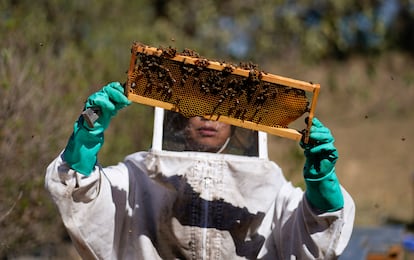Let it bee: The women on a mission to save Mexico City’s bees
They call themselves Abeja Negra SOS — a group of mostly women working hive by hive to relocate bees that would be exterminated if they remained in Mexico’s crowded capital city

“Knife,” Adriana Velíz says with the concentration of a brain surgeon.
Shrouded in a white bee suit, she lies stretched out on the ground in one of Mexico City’s most buzzing districts. Taking the knife, she pries open the side of a light post and flashes a glowing red lantern on a humming bee hive.
Velíz is on a mission to save the approximately 20,000 bees inside.
She heads a group of mostly women who are working hive by hive to relocate bees that would be exterminated if they remained in Mexico’s crowded capital city.
The group, Abeja Negra SOS, was born in 2018 when Velíz — a veterinarian working for the city government at the time — noticed that when authorities received calls about beehives, the automatic response was to exterminate the bees.
She and other colleagues began looking for an alternative.
“We do these rescues because it’s a species that’s in danger of extinction,” said Velíz, who works for Abeja Negra SOS. “We’re an alternative so that the emergency teams don’t exterminate them. We give them a second chance.”
Globally, bee populations have been decimated in recent decades. The United States alone is estimated to have lost around 25% of its bees in the past 40 years. Earlier this year, beekeepers in southern Mexico mourned the “mass killing” of millions of bees by pesticides.
The drop is often blamed on human causes: the use of damaging chemicals, destruction of natural habitats and climate change. Scientists and world leaders warn that bee population decline could have a wide range of detrimental ripple effects.
In 2019, the United Nations raised an alarm that bee loss “poses a serious threat” to global food security. Others like Adriana Correa Benítez, a professor researching bees at National Autonomous University of Mexico, said loss of bees could make it more difficult for Mexico to mitigate climate change.
“They don’t just pollinate what we eat,” she said. “They also pollinate native plants that regulate the entire ecosystem. And now, with climate change, reforestation is so important and (bee pollination) really influences that.”
Over the past five years, the group has traveled across the sprawling city of 9 million, saving bee colonies from trees, street gutters and lamp posts. They have relocated around 510 hives, with an average size of about 80,000 bees.
Late on a recent Thursday night, Velíz peers into the hive the size of a small melon lodged inside the street lamp.
She gently slices a knife along the side of the hive, letting out a gentle “shhh,” as if calming a child. Knife dripping with honey, she pulls the honeycomb out and places it in a wooden square frame, which she slides into a wooden box.
Tonight, they are lucky, she says. This is a small colony and it’s calm, Velíz explains, referring to the hive as “hippie bees.”
As they go, they search for the queen, a key element to rehabilitating the bees and assuring the colony gets relocated smoothly.
“You hear that? That means we have the queen,” she says, tilting her hear toward the box where the bees’ chaotic buzz turns into a purr.
Because many of the bees in Mexico come from African roots, they can be more aggressive than the average honeybee. This can create problems in big cities, where residents often associate the insects more with danger than their environmental importance.
Velíz said the group’s dozen or so bee handlers are mostly women.
“We tried to work with men, but they seem to love the danger,” Velíz said. “We began to see that it wasn’t very viable, so we began to contract just women. We realized that we can do the exact same as them, and often even do it better.”
Once a hive is safely stored inside the box, the group takes the bees to the rural outskirts of the city, where they can recover and grow strong. They later donate the bees to local bee farmers or release them into the wild.
The team has run into hurdles because they charge a bit more than $300 for removing a hive, mainly to cover logistical costs. For many in the city, it’s still easier to call firefighters to exterminate bees for free.
Yet, as the project has grown, Abeja Negra SOS has also generated a buzz, inspiring other groups to emerge and start doing the same work.
“With what we do, we may not be changing the world, but we’re at least changing the situation in our city,” Velíz said.
Sign up for our weekly newsletter to get more English-language news coverage from EL PAÍS USA Edition
Tu suscripción se está usando en otro dispositivo
¿Quieres añadir otro usuario a tu suscripción?
Si continúas leyendo en este dispositivo, no se podrá leer en el otro.
FlechaTu suscripción se está usando en otro dispositivo y solo puedes acceder a EL PAÍS desde un dispositivo a la vez.
Si quieres compartir tu cuenta, cambia tu suscripción a la modalidad Premium, así podrás añadir otro usuario. Cada uno accederá con su propia cuenta de email, lo que os permitirá personalizar vuestra experiencia en EL PAÍS.
¿Tienes una suscripción de empresa? Accede aquí para contratar más cuentas.
En el caso de no saber quién está usando tu cuenta, te recomendamos cambiar tu contraseña aquí.
Si decides continuar compartiendo tu cuenta, este mensaje se mostrará en tu dispositivo y en el de la otra persona que está usando tu cuenta de forma indefinida, afectando a tu experiencia de lectura. Puedes consultar aquí los términos y condiciones de la suscripción digital.








































